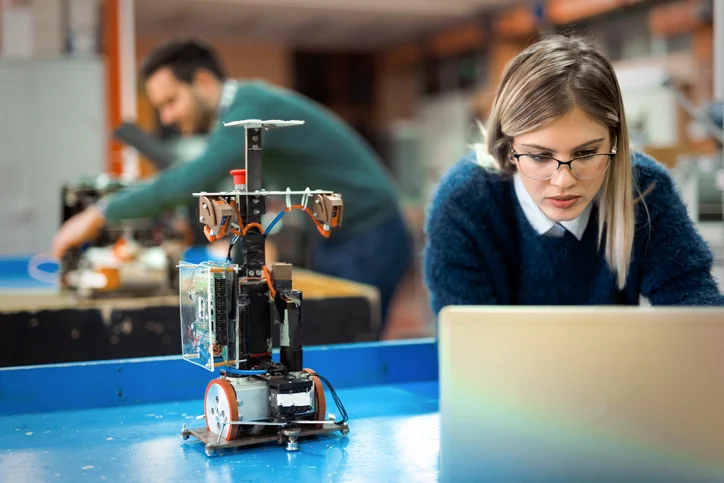Becoming one robotics engineer will enable you to work in various industries and get a competitive salary. Like most positions, there are pros and cons to the career, and it has specific requirements for qualifications.
Today, we will explain what a robotics engineer is and all aspects of this profession to help you decide if it is the right choice for you.
Job Description
What is Robotics?
These experts design and develop automated robotic systems to improve productivity and precision. They also regularly collaborate with other developers and fellows to research and analyze the requirements of robotics projects.
Robotics is always considered a high-end professional career in many countries. As a result, many tremendous job expectations await experts with good knowledge and experience in this field.
What Is Robotics Engineering?
Robotics engineering involves an interdisciplinary branch of computer science & engineering. In this field, engineers are responsible for creating, testing, updating, and developing robots and robotic equipment.

What Are Robotics Engineers?
Robotics engineers design and develop robotic systems and analyze technical schematics and procedures. These experts also draft sketches and blueprints to demonstrate their ideas before modifying them according to received feedback.
These experts perform essential research to decide the parameters of robotic applications. Also, they may be responsible for cost estimates and perform quality control and integration tests.
Many engineers deliver technical support and troubleshoot robotic applications and systems. They also might have to evaluate and fine-tune systems to improve efficiency.
Finally, these experts are in charge of maintaining accurate records and documentation.
Roles and Responsibilities
The roles and responsibilities of robotics engineers can vary depending on the company and industry. But there are still commonalities regarding their responsibilities, including:
- Designing and developing robotic systems
- Analyzing technical schematics and procedures.
- Drafting sketches and blueprints to demonstrate their ideas
- Modifying sketches and blueprints based on received feedback.
- Performing essential research to decide the parameters of robotic applications.
- Assisting with cost estimates.
- Providing technical support if necessary.
- Performing quality control and integration tests.
- Maintaining accurate records and documentation.
- Maintaining knowledge of developing and existing technology and trends.
- Applying machine learning techniques.
- Evaluating and fine-tuning systems for maximum efficiency.
- Troubleshooting robotic applications and systems.
What is the Work Environment like?
Robotics engineers usually spend most of their time on their feet when they design, evaluate, and test in production areas or labs.
Working on their feet can be good for their fitness and is an excellent option for those who love standing to sit at desks during the day.
They sometimes spend some time at a desk working with computer programs, which only accounts for a small portion of their day. Staying on their feet can help them feel more energized throughout the workday and can help them reach some fitness goals.
Several engineers have to travel for work to other countries, letting them visit new areas at their employer’s expense. They may regularly participate in robotics conventions, seminars, or even competitions. These pros may be part of a multi-company collaboration, consultation, or team event.
Working abroad can expose them to new cultures and the rich history of many unique locations.
Robotics engineers use machine learning techniques for their tasks and maintain knowledge of developing or existing technology and trends in the robotics field.
Education Requirements

To work as a robotics engineer, you need to earn a bachelor’s degree in Robotics Engineering. Courses in robotics usually include general training in hydraulics and pneumatics, CADD/CAM systems, numerically controlled systems, logic, integrated systems, and microprocessors.
But universities do not always deliver this degree. As robotics technology often relies significantly on the expertise of some engineering disciplines, employers can accept a degree in industrial engineering, mechanical engineering, mathematics, computer engineering, or mechanical engineering.
For an upper-level position within the industry, you will need to take a master’s or even doctorate.
Robotics engineers must continually update their technical knowledge to keep up with new developments and changes within the industry. This requirement is typically satisfied by seminars, training sessions, and annual conferences.
Essential Skills

To be a successful robotics engineer, you need to hone and strengthen many skills, including:
Interpersonal Skills
- Teamwork
- Industry skills
- Listening skills
- Leadership skills
- Presentation skills
- Technical expertise
- Ability to solve easily
- Critical thinking skills
- Communication skills
- Ability to work under pressure
- Strong analytical and mathematics skills
Trending Technologies in Robotics
- IoT in Robotics
- Cloud Robotics
- Robots as a Service
- Proliferation of Drones
- Automation of Robots
- Industrial Cyber Security
- 3D Printing and Chatbots
- Robotic Process Automation
- Autonomous or Driverless Cars
- 3D technology and Artificial robots
- Commercial Class Legged Robots
Skill To Analytic and Solve Problems
It is the ability to study the information, utilize logic to find patterns, and find the ideal solutions in a timely and efficient manner. The more you solve, the better you will get to understand easily.
Technical Skills Required for Robotics Engineers/Graduates
- Automation
- Bio-cybernetics
- Micro-robotics
- Signal processing
- Robot manipulators
- Artificial intelligence
- Robot motion planning
- Computational geometry
- Computer-Aided Manufacturing
- Air traffic management systems
- Digital electronics and microprocessors
- Computer integrated manufacturing systems
Essential Tools
Here are tools that are most affordable and practical for average robot builders.
Mechanical Tools
- Safety Glasses
- Metal and Wood Saws
- Pliers
- Hobby Knife
- Electric Drill and Drill Bits
- Screwdrivers and Wrenches
- Hammer
Soldering Iron
It is an essential apparatus for interfacing copper wires together and gathering electronic circuits.
Breadboard
Breadboards are an excellent robotics tool to build a temporary, especially if you are searching for tools for prototypes or robotics.
Electronic Equipment
- Variable power supply
- Oscilloscope
- Signal generators
- LED’s
- Multi-meter
Miscellaneous Robotics Tools
- Thicker wire
- Measuring Tapes
- Hot glue gun
- RJ45 network connector
- Insulation Displacement Connectors
Job Outlook
Robotics is one of the emerging fields that deliver diverse job opportunities for any aspiring roboticist.
Robotics is present in many industries, giving you more opportunities for employment and potential career growth. Some industries can deliver higher pay for more complex work.
For example, robotics engineers who work in the mining sector often earn more than engineers in the retail industry as the nature of mining work is complex.
Having the option to work in various industries will help you work within an area of passion and look for fulfillment in your career.
Salary
The average annual salary for a robotic engineer in the US is $108,310. This average salary equals $52.07 per hour, $2,083 per week, or $9,026 per month.
Most robotic engineers’ salaries range from $83,138 to $132,494, with top earners earning approximately $163,361 annually across the US.
The average salary range for a robotic engineer differs significantly (by as much as $66,949), suggesting there may be plenty of opportunities for advancement and increased pay based on location, years of experience, and skill level.
Advantages and Disadvantages
Robotics engineers get many career benefits, including the following:
- Competitive salary
- Various job opportunities
- Active work environments
- Opportunities for travel
There are several challenges to the career of a robotics engineer. Consider the following hurdles:
- Extensive education
- High-pressure work environment
- Hazardous workspace
- Inadequate diversity
- Creative liability
FAQs
What are Top Robotics Jobs?
The following are some exciting career options you can pursue with your associate’s, graduate, or master’s degree in robotics:
- Sales Engineer.
- Design Engineer.
- Robotics Engineer.
- Aerospace Engineer.
- Software Engineer.
- Hardware Engineer.
- Computer Scientists.
- Mechanical Engineer.
- Electromechanical and Robotics Technician.
- UI/UX (User Interface/User Experience) Designer.
Is Robotics a Good Career?
Robotics is considered one of the excellent vocations since industries increasingly rely on autonomous systems to improve their speed, efficiency, and cost-effectiveness.
Along with a high salary, this profession allows you to learn many cutting-edge technologies and gain tremendous growth.
What Are the Five Major Fields of Robotics?
From medical to engineering and from home to space research, the applications and use of robots are looking for new ground.
Here are some top fields of robotics application:
- Programming
- Operator Interface
- Mobility or Locomotion
- Sensing and Perception
- Manipulator and Effectors
What Type of Degree Do I Need to Be One Robotics Engineer?
It is okay to complete a bachelor’s, associate’s, or master’s program in robotics.
In addition, you can pursue minors in robotics with a core engineering degree to get employment in this field.
An associate’s degree will prepare you for technician roles, while a higher education program will let you gain advanced research roles in robotics.
Where Might Robotics Engineers Work?
As a robotics engineer, you can work for various employers.
You can seek a job in manufacturing companies and spend time maintaining, or designing, the machines that perform a lot of the labor.
These experts can also work in a research lab for universities or private companies. In this case, they are hard at work in areas such as artificial intelligence and robotic dexterity.
Robot engineers can work for the government as well. They can work for NASA, building robots to aid deep sea exploration, space exploration, or science tasks in the upper atmosphere.
On the flip side, these specialists work with militaries to make bomb-diffusing robots or self-driving trucks that can take troops anywhere.
Finally, robotics engineers can work with clients to design and build the intelligent machines they want for some operations.
Career Advice
Nowadays, automation is a keyword, and robotics engineers should be driving that trend. Whether it is transportation, entertainment, scientific endeavors, or manufacturing, robot scientists make machines that can automate and simplify tasks for everyone.
Robotics engineers have distinct personalities. These professionals tend to be investigative people who are introspective, inquisitive, and intellectual.
They are also curious, rational, analytical, logical, and methodical. Some are also realistic, which means they are stable, persistent, genuine, independent, practical, and thrifty.
If you possess the above qualities, robotics engineering is one of the ideal professions for you. You can start your career by getting certifications in a relevant field, gaining certification (optional), and honing essential skills.
